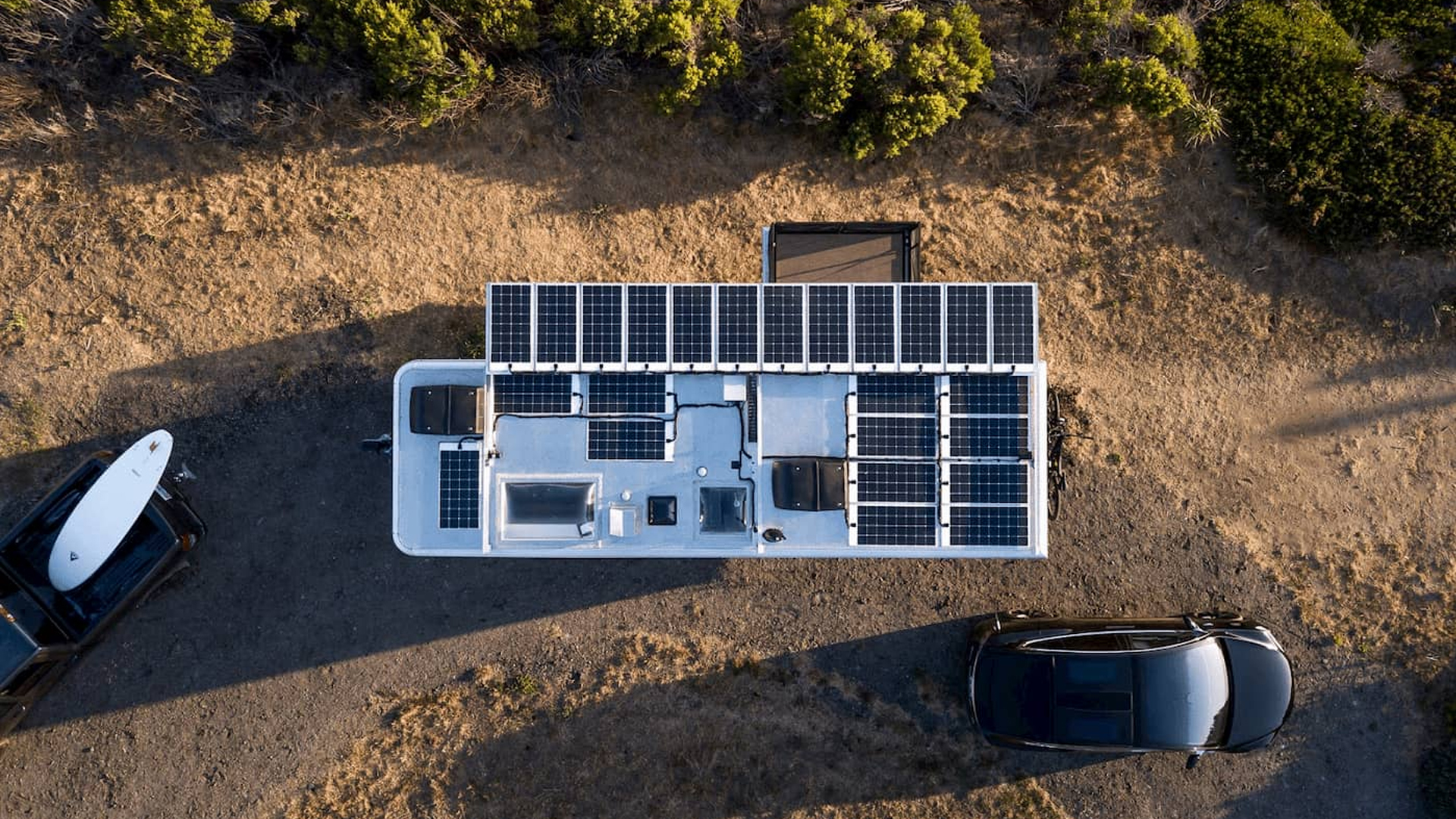
The Best Solar Panels for Your RV
Table of contents
Harnessing solar energy for your RV is a smart and sustainable choice, allowing you to explore off-grid locations with ease and confidence. Whether you’re a full-time RVer or a weekend warrior, the best solar panels for RVs will ensure that you have reliable power without the need for noisy generators or constant hookups. In this guide, we’ll explore the best solar panels for RV, the best RV solar panels, the best solar for RV, and the best RV solar kit options available, and help you make an informed decision for your power needs.
Benefits of Using RV Solar Panels
Using solar panels on your RV comes with a multitude of benefits that enhance your traveling experience. Here are some of the key advantages:
- Eco-Friendly Power Source: Solar panels provide a clean and renewable energy source, reducing your carbon footprint.
- Cost Savings: Once installed, solar panels can significantly cut down or even eliminate the need for paid electricity sources, saving you money in the long run.
- Silent Operation: Unlike generators, solar panels operate silently, providing a peaceful environment.
- Low Maintenance: Solar panels require minimal maintenance, making them a hassle-free power solution.
- Independence and Flexibility: With solar panels, you have the freedom to camp in remote locations without worrying about power availability.
- Increased RV Value: Adding a solar power system can increase the resale value of your RV.
- Sustainable Travel: Embracing solar power promotes sustainable travel practices, contributing to environmental preservation.

Types of RV Solar Panels
There are three main types of solar panels to consider for your RV. Each has its own advantages and disadvantages, and understanding these will help you choose the best option for your needs.
Monocrystalline
Monocrystalline solar panels are made from a single crystal structure. They are known for their high efficiency and long lifespan.
- Pros:
- Highest efficiency rates (15-20%)
- Space-efficient: They produce more power in less space
- Long lifespan: Often comes with warranties up to 25 years
- Cons:
- Higher cost compared to other types
- Performance decreases significantly in low-light conditions
Polycrystalline
Polycrystalline solar panels are made from silicon crystals melted together. They are slightly less efficient than monocrystalline panels but are more affordable.
- Pros:
- Lower cost than monocrystalline panels
- Less silicon waste during production
- Durable and reliable
- Cons:
- Lower efficiency rates (13-16%)
- Larger size is required to produce the same amount of power as monocrystalline panels
Amorphous
Amorphous solar panels, also known as thin-film panels, are made by depositing a thin layer of silicon onto a substrate. They are the least efficient but offer unique benefits.
- Pros:
- Flexible and lightweight, making them easy to install on curved surfaces
- Perform better in low-light conditions
- Often more affordable
- Cons:
- Lowest efficiency rates (6-10%)
- Require more space to produce the same power output
- Shorter lifespan compared to crystalline panels
What to Consider When Buying RV Solar Panels
When choosing the best solar panel for RV, there are several factors to consider:
- Power Needs: Determine your energy consumption by calculating the total wattage of the devices you plan to power.
- Panel Efficiency: Higher efficiency panels generate more power in less space, which is crucial for RV installations.
- Space and Weight: Assess the available space on your RV roof and the weight capacity.
- Durability: Look for panels that are built to withstand the rigors of travel and varying weather conditions.
- Ease of Installation: Some kits come with all necessary components and easy-to-follow instructions.
- Cost: Balance your budget with the quality and features of the solar panels.
- Warranty: A good warranty indicates the manufacturer’s confidence in their product’s longevity and performance.
- Compatibility: Ensure the solar panels are compatible with your RV’s electrical system and any existing components.
The 5 Best RV Solar Panels to Consider
To help you choose, we’ve compiled a list of the best RV solar panels and best RV solar kits available. Each of these options has been selected based on their performance, reliability, and user reviews.
1. Renogy 12-Volt Solar RV Kit
Power Output: 200W
Weight: 33.1 lbs
Pros:
- High-efficiency monocrystalline panels
- The comprehensive kit includes a charge controller, cables, and mounting brackets
- Expandable with additional panels
- Excellent customer support and warranty
Cons:
- Higher initial cost
- Requires some DIY skills for installation
2. Jackery SolarSaga 100
Power Output: 100W
Weight: 5.5 lbs
Pros:
- Lightweight and portable
- Foldable design with built-in kickstands
- Compatible with Jackery power stations
- Easy plug-and-play setup
Cons:
- Lower power output suitable for smaller setups
- Not ideal for permanent roof installation
3. Eco-Worthy 12V Solar Panel
Power Output: 120W
Weight: 19.6 lbs
Pros:
- Affordable price point
- Durable and weather-resistant
- Easy to install with pre-drilled holes
- Good balance of efficiency and cost
Cons:
- Slightly heavier compared to similar panels
- Charge controller not included
4. Bluetti PV350 Solar Panel
Power Output: 350W
Weight: 30.6 lbs
Pros:
- High power output
- Foldable and portable
- Durable construction
- Excellent for off-grid power needs
Cons:
- Higher price
- Heavier and bulkier than other portable options

5. Goal Zero Nomad 100
Power Output: 100W
Weight: 10.2 lbs
Pros:
- Lightweight and foldable
- Rugged and weather-resistant
- Integrated USB ports for direct charging
- Compatible with Goal Zero power stations
Cons:
- Lower power output
- More expensive than similar wattage panels
FAQs
What kind of solar panels are best for RV?
The best kind of solar panels for an RV depends on your specific needs and budget. Monocrystalline panels offer the highest efficiency and are ideal for limited roof space, while polycrystalline panels are more affordable but less efficient. Amorphous panels are flexible and perform better in low-light conditions but are the least efficient.
What is the highest efficiency solar panel for RV?
Monocrystalline solar panels are the highest efficiency option for RVs, with efficiency rates typically between 15-20%.
How many solar panels do I need to run everything in my RV?
The number of solar panels you need depends on your energy consumption and the power output of the panels. A typical RV setup might require 200-400 watts of solar power to run basic appliances, but this can vary widely based on individual usage.
What will a 400-watt solar panel run in an RV?
A 400-watt solar panel setup can run small appliances like lights, fans, a refrigerator, and charge electronic devices. It may not be sufficient for high-power appliances like air conditioners without additional panels or power storage solutions.
Can you have too much solar on an RV?
While having more solar power than needed isn’t harmful, it can be unnecessary and costly. It’s important to balance your power needs with the available space and budget to avoid overspending on excess capacity.
In conclusion, investing in the best solar panels for RV will enhance your travel experience by providing reliable, eco-friendly power. By considering your specific needs and the various options available, you can select the best RV solar panels and the best RV solar kit to keep your adventures powered up and ready to go.
Ready to Elevate Your RV Experience?
It’s time to think about the next essential upgrade: Custom Skirting!
Don’t compromise on quality or convenience when it comes to protecting your RV. Our custom skirting solutions provide unparalleled protection and insulation, ensuring you can enjoy your adventures regardless of the weather.
Experience the nation’s #1 RV skirting solution with our exclusive “No-Snap, No-Gap” channel system. This innovative design seals out water, snow, and wind more effectively than any other product on the market. Our skirting has been tested and improved over a decade, enduring the harshest winters across the northern United States and Canada, and has emerged as the top choice for RV enthusiasts.
